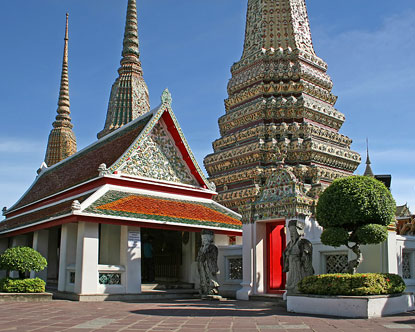
Annette Knight
There is no official state religion in Thailand; however, Buddhism is recognized and supported by the government as the oldest and most prominent religious tradition in the country. Additionally, the constitution requires that the monarch be Buddhist. According to the 2010 census, Thailand had a population of 66 million. The religious demographics showed 93 percent of the population was Theravada Buddhist and 5 percent was Muslim, the majority being of the Sunni tradition. Less than 5 percent of the remaining population was Animist, Christian, Confucian, Hindu, Sikh, and Taoist.
Theravada Buddhism, the dominant religion, is not an exclusive belief system, and most Buddhists also incorporate Brahmin-Hindu and animist practices. The Theravada Buddhist clergy (Sangha) consists of two main schools: Mahanikava and Dhammayuttika. The former is older and more prevalent within the monastic community than the latter. The same ecclesiastical hierarchy governs both groups. The majority of ethnic Chinese and Vietnamese practice either Theravada Buddhism or the other principal Buddhist philosophy, Mahayana Buddhism. Many ethnic Chinese, as well as members of the Mien hill tribe, practice forms of Taoism. Other hill tribes in Northern Thailand include the Hmong, Yao, Karen, Lisu, Lahu, Lawa, Akha, Khamu, Thins, Mlabri, and the Palong. Islam is the dominant religion in four of the five southernmost provinces. The majority of Muslims in these provinces are ethnic Malay, but the Muslim population nationally also includes descendants of immigrants from South Asia, China, Cambodia, Indonesia, and those who consider themselves ethnic Thai.
The government recognizes five religious groups: Buddhists, Muslims, Brahmin-Hindus, Sikhs, and Christians. Additionally, the Thai government recognizes five Christian denominations: the Church of Christ in Thailand (Protestant); the Catholic Mission of Bangkok (Roman Catholic); Saha Christchak (Baptist); the Evangelical Fellowship of Thailand; and the Seventh-day Adventist Church of Thailand. While the oldest recognized Christian group is the Church of Christ in Thailand, the Catholic Mission of Bangkok has the largest group of adherents, with 114,260 and 335,100 respectively. The government has not recognized a religious group since 1984; however, unregistered religious groups operate freely and are not restricted by this government practice.
Muslim professors and clerics, particularly in the southernmost provinces, continue to face additional scrutiny because of continuing government concern about Malay Muslim separatist activities. While this usually does not appear to inhibit their religious activities, government officials continue to be concerned that some Islamic schools are used to indoctrinate youth into the conflict. Conversely, some reports concluded that southern insurgents targeted state schools and teachers because they perceived them to be part of an effort to impose Thai Buddhist culture on the region.
While the conflict in the South is primarily about ethnicity and nationalism, the close connection between ethnic and religious identity caused it to take on religious overtones. The majority of killings in the southernmost provinces since the escalation of the conflict have been the result of Muslim on Muslim violence. However, violence perpetrated by ethnic Malay Muslims against ethnic Thai Buddhists in the southernmost provinces exacerbated tensions and invited retaliatory killings and human rights abuses by both groups. As a result there were a number of cases in which the violence in the region undermined the ability of citizens to practice the full range of their religious activities.
Violence has occurred nearly every day in Thailand’s three southernmost provinces since the insurgency erupted in 2004. The militants have mainly targeted security forces and teachers, who are seen as representatives of the government of the Buddhist-dominated nation. Muslims in the border region, which was an independent Islamic sultanate until it was annexed by Thailand in the early 20th century, have long complained of discrimination by the central government in Bangkok, and the insurgents are thought to be fighting for autonomy. But the insurgency remains murky, with militants making no public pronouncements on their goals. The Barisan Revolusi Nasional (BRN) is one of several separatist movements that have made public calls for a separate state in Thailand’s Muslim-dominated south.
On February 28 2013, Thailand’s government signed a breakthrough deal with Muslim insurgents, namely the BRN, for the first time ever, agreeing to hold talks to ease nearly a decade of violence in the country’s southern provinces that has killed more than 5,000 people. It is seen as a positive step, but is unlikely to end immediately the conflict. Several other shadowy guerrilla movements, also fighting in southern Thailand, have yet to agree to talks. While the signing is “merely the starting point of a long process” it is a “solid demonstration of the common resolve to find and establish an enduring peace in southern Thailand.”
Thailand has been given the score of Moderate on the Pew Forum’s Social Hostilities Index. The Moderate category is scored at 1.9 to 3.2. The U.S. is also in the same category.
In the drafting of the 2007 constitution, a provision was strongly considered that would make Buddhism the state religion, and, it was thought, to assure a Buddhist king. Although the provision was to be largely symbolic, without legal weight or substantive effect on religious practices in Thailand, analysts said it would be dangerously divisive at a moment when Buddhists and Muslims were confronting each other in the south more directly and violently than ever. The provision failed.